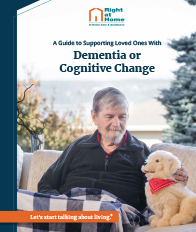Understanding the Role You and Dementia Caregivers Play
Understanding the Role You and Dementia Caregivers in Staten Island, NY Play During Each Stage of Alzheimer’s
Preparation for families looking to support their loved one’s at home
Did you know your senior can extend their independence at home by having the right support system in place, despite a dementia diagnosis? Typically, this support is provided by friends, family, and neighbors before help from a team of highly trained dementia caregivers is sought.
Taking on the role of caring for your loved ones has many rewards, but lack of knowledge and experience can have negative effects on all involved.
One of the most common forms of dementia, Alzheimer’s disease, progresses in 3 stages. While individuals progress at different rates, each stage normally lasts a few to several years and all possess their own unique challenges. To provide your loved one with the highest quality care, you’ll need to have a clear understanding of:
- Your role in your loved one’s care and how it will evolve with each stage
- How to prepare for several different behavioral changes and communication challenges
Early Stage
This stage of Alzheimer’s requires minimal assistance from familial support groups, as your loved one is still able to maintain their primary means of independence. The most difficult part of your role will be knowing how much assistance to provide.
Your loved one will begin to display signs of cognitive regression such as the loss of short term memory, withdrawal from social situations, or difficulty with simple tasks. It is best to always give your loved one encouragement and patience. Be gentle with reminders, continue to encourage physical and social activities, and identify situations that bring your loved one great stress.
Given your required involvement is minimal, this is the best stage to begin:
- Appointing one or two family members as a main point of contact and managers of care
- Appointing a trusted relative to make future medical, legal, and financial decisions
- Having conversations with your loved on regarding their current needs, as well as future desires
- Researching professional support groups and care agencies to further build your support network
- Researching behavioral changes that will occur in your loved one and how to manage them
- Creating a Record of Care to be shared with doctors and care providers that tracks your senior’s behavior, medications take, diet, etc.
Mid Stage
 During the Mid stage of Alzheimer’s, your loved one will begin to have greater difficulties with memory, communication, comprehension, and the complement of daily tasks. They will also begin to display common behaviors such as increase aggression, anxiety, depression, and sundowning. The expertise of a team of dementia caregivers is often necessary to support the needs of the senior and the family.
During the Mid stage of Alzheimer’s, your loved one will begin to have greater difficulties with memory, communication, comprehension, and the complement of daily tasks. They will also begin to display common behaviors such as increase aggression, anxiety, depression, and sundowning. The expertise of a team of dementia caregivers is often necessary to support the needs of the senior and the family.
As a partner in your loved one’s care, your role will involve working with their caregiver to:
- Continue managing your loved one’s Record of Care
- Establish a daily routine to reduce confusion, frustration, and anxiety
- Develop simple means of communication
- Provide greater assistance with personal care, homemaking, and transportation needs
- Rearrange the home to better accommodate your loved one’s needs and increase safety
- Schedule breaks to care for yourself or enlisting respite services
Late Stage
During this final stage of Alzheimer’s, your loved one will be completely dependent on your family, dementia caregivers, and other health professionals. Symptoms and behaviors from the previous stages will increase tenfold, in addition to physical complications such as difficulties swallowing or walking. As a consistent eye and expertise is needed, it is best for all to consider support from a specialized nursing facility.
Despite this major change in the support system, your role in your loved one’s care is still important. You will be a key in assisting with:
- Coordinating with doctors and other health providers to ensure their needs are being met
- Providing companionship as well as leaving companions such as a stuffed animal
- Bringing the comforts of home to them in the form of old pictures, a favorite blanket, incents to provide a familiar smell, or their favorite meal
- Preparing final arrangements
Dementia & You
Caring for someone with a cognitive disease requires much time, patience, flexibility, and knowledge. From accepting the diagnosis to the very last stage, it is important that you are prepared to support your loved one as well as yourself. Contact us today online or at (347) 554-8400 to learn more about our service options, dementia caregivers, and how we can keep your loved one Right at Home.

Dementia or Cognitive Change Guide
A free downloadable guide for those supporting loved ones with Dementia or Cognitive Change



